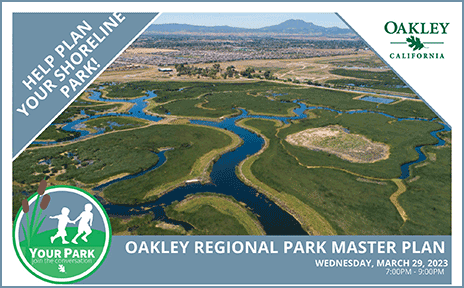The City of Oakley is hosting a community input meeting on Wednesday, March 29th at 7 pm at the Oakley Recreation Center.
This meeting will kick off the master planning process for the future 55-acre park at the north end of Sellers Avenue. Attendees can share comments, ask questions, and participate in interactive activities, which will provide an updated vision and direction for the future development of the park.
Join the conversation! If you can’t make the meeting, there will be additional opportunities to provide input through a survey coming out soon.
- Wednesday, March 29
- 7:00 pm to 9:00 pm
- Oakley Recreation Center
- 1250 O’Hara Avenue
- Oakley, CA
Editors Note:
At the November 8 Oakley City Council Meeting, the City Council agreed to a Landscape Architectural and Master Planning Services for the 55-acre Oakley Community Regional Park.
The council approved the item in a 4-1 vote with Councilmember George Fuller dissenting saying he didn’t see the value of the park and suggested they turn it into affordable housing or senior living. With council giving the approval, the community outreach will begin in February 2023 to allow input on an updated plan for the 55-acre park.
Back in January 2018, it was shared that this project has been in the works since 2002 when the Dutch Slough Memorandum of Understanding occurred with the idea of a 55-acre community park—this includes the 27-acre Burroughs Property and the 8-acre parcel to the north end of Jersey Island Road.
In October 2018, the Dutch Slough Tidal Restoration Project will re-establish a rich ecological network that will boost survival rates of endangered fish and wildlife while also protecting neighborhoods against flooding.
Located on the Delta’s western edge, the Dutch Slough Tidal Marsh Restoration Project will transform 1,187 acres of a former grazing area into a rich habitat for fish and wildlife. The project is part of the California EcoRestore Initiative, a multi-agency endeavor to restore more than 30,000 acres of wildlife habitat in the Delta by 2020. EcoRestore marks the Delta’s largest-ever restoration program.
Tidal marsh elevation requires land that gradually slopes upward. In May 2018, DWR began moving dirt from higher elevations to lower elevations, so that water can eventually flow in from the Delta channels and out with the daily tides. The project is expected to be completed once the levees are breached in 2021, and native fish and wildlife can populate the are
Previous Stories:
- Sept. 13, 2021: City of Oakley to Hold Work Session for Possible Polo Field at 55-Acre Park
- June 25, 2019: Oakley Seeks Input on What the Name of $50 Million Park Should Be
- April 10, 2019: Oakley Seeks Input on $50 Million Community Park
- Jan. 8, 2019 Agenda: click here
- Dec. 31, 2018 Agenda: click here
- Dec. 30, 2018: Oakley Set to Discuss $50 Million Community Park Project
- Oct. 21, 2018: Restoring the Wetlands: Dutch Slough Project Breaks Ground in Oakley

